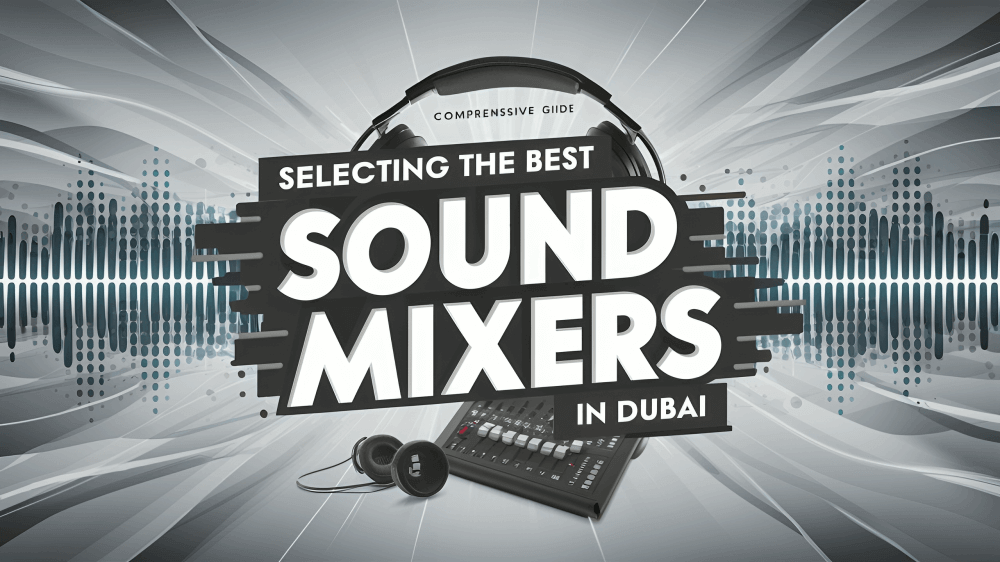Full Guide to the Choose Best Sound Mixers in Dubai

Unleashing the Magic of Sound: A Guide to the Best Sound Mixers in Dubai
Sound mixers, also known as audio mixers or mixing consoles, serve as the control centers for audio setups. They allow sound engineers and enthusiasts to blend, manipulate, and enhance audio signals from various sources, such as microphones, instruments, and media players.
In this blog, we’ll delve deep into the world of sound mixers. We’ll begin by unraveling the fundamental concepts. Then, we’ll guide you through choosing the suitable sound mixer for your needs.
Let’s Start!
Understanding Sound Mixers in Dubai
At its core, a sound mixer is a sophisticated device designed to manipulate and control audio signals. They serve as the nerve center where audio inputs from microphones, instruments, playback devices, and more converge, granting you the power to create a balanced and harmonious soundscape.
The Role of Sound Mixers in Audio Production
The role of sound mixers in audio production is nothing short of transformative. They enable sound engineers and enthusiasts to achieve the following:
– Signal Blending: Sound mixers blend multiple audio sources seamlessly, ensuring each component contributes harmoniously to the final audio output.
– Volume Control: Precise control over the volume of each input allows for creating dynamic and expressive audio experiences.
– Tone Shaping: Sound mixers offer EQ (equalization) controls to shape the tonal qualities of audio signals, enhancing clarity and impact.
-Effects Processing: Many sound mixers are equipped with built-in effects processors, enabling the addition of reverb, delay, compression, and other effects to enrich the audio.
– Signal Routing: They facilitate the routing of audio signals to various outputs, such as speakers, recording devices, or broadcast equipment.
Types of Sound Mixers
Sound mixers come in various flavors, catering to different preferences and requirements:
1. Analog Mixers: These mixers use physical components to manipulate audio signals. They are known for their simplicity and warm, analog sound quality. Analog mixers are favored in live sound applications and recording studios.
2. Digital Mixers: Digital mixers employ digital signal processing to provide precise control and a wealth of features. They offer the advantage of preset recall extensive effects and often integrate with computer recording setups. They are versatile and found in both live and studio settings.
3. Software Mixers: Software-based mixers run on computers and use digital audio interfaces to process and manipulate audio. They are highly flexible, cost-effective, and famous for home studios and digital audio workstations (DAWs).
Understanding these types of sound mixers is the first step in making informed choices about which best suits your needs. Whether you’re an aspiring musician, a sound engineer, or simply someone who appreciates high-quality audio, sound mixers are your gateway to audio production mastery.
Key Features to Consider
Now that we understand what sound mixers are and their critical role in audio production let’s explore the key features you should consider when choosing the suitable sound mixer for your needs.
A. Number of Channels
The number of channels on a sound mixer dictates how many audio sources you can connect simultaneously. Consider your requirements carefully. If you’re running a small podcast, a mixer with a few channels may suffice, but larger setups like live concerts or recording studios may demand mixers with dozens of channels.
B. Inputs and Outputs
Evaluate the types of inputs and outputs a sound mixer offers. Information can include XLR connectors for microphones, 1/4″ jacks for instruments, and RCA connectors for consumer devices. Outputs might include main mix outputs, auxiliary sends, and subgroups. Ensure the mixer accommodates your specific devices and setup.
C. Built-in Effects and Processing
Some sound mixers have built-in effects processors, such as reverb, delay, EQ, and compression. If you require these effects, opt for a mixer that offers them. However, a basic mixer without effects may suffice if you prefer external effects units or plan to use software plugins.
D. Portability and Form Factor
Consider where and how you’ll be using the sound mixer. If you’re on the move, a compact and lightweight mixer may be ideal. On the other hand, permanent installations or studio setups can accommodate larger mixers. Factor in the mixer’s form factor to ensure it fits comfortably in your workspace.
F. Budget Considerations
Budget plays a significant role in your decision. Sound mixers come in a wide price range. While high-end mixers offer advanced features and pristine sound quality, budget-friendly options are available for those starting out or with limited funds. Remember that a higher price tag only sometimes guarantees a better fit for your needs.
Choosing the suitable sound mixer involves balancing these key features and your requirements. By carefully considering the number of channels, inputs and outputs, built-in effects, portability, connectivity, and budget, you can find the perfect mixer to elevate your audio production endeavors.
FAQs About Sound Mixers
Which is better, mixer or equalizer?
The choice between a mixer and an equalizer depends on your audio needs. A mixer blends and controls multiple audio sources, making it essential for managing various inputs. On the other hand, an equalizer fine-tunes the tonal qualities of audio signals. They serve different purposes, and often, you may need both for optimal sound control.
Which is better, amplifier or mixer?
Amplifiers and mixers have distinct roles. An amplifier boosts the strength of audio signals, making them louder. A mixer combines and manages multiple audio sources. The choice depends on your setup; a mixer is essential if you need to control various audio sources. However, amplifiers are necessary for powering speakers and delivering sound at the desired volume.
What is the difference between a sound mixer and an amplifier?
A sound mixer combines and manages audio sources, adjusting their volume, tone, and effects. It’s like the control center for audio. On the other hand, an amplifier increases the strength of audio signals, making them loud enough to be heard through speakers. While mixers shape the sound, amplifiers make it audible.
What does a sound mixer do?
A sound mixer, or an audio mixer or mixing console, manages audio signals from various sources. It allows you to control these signals’ volume, tone, effects, and routing. Sound mixers are essential in live events, recording studios, and audio production to ensure a balanced and harmonious sound output.
Conclusions:
Selecting a suitable sound mixer is not merely a technical decision; it’s an artistic and strategic one. The sound mixer you choose will shape the audio experiences you create or enjoy. A well-matched sound mixer enhances audio’s clarity, depth, and impact, whether it’s music, podcasts, live events, or studio recordings. It’s the cornerstone of achieving audio excellence.







